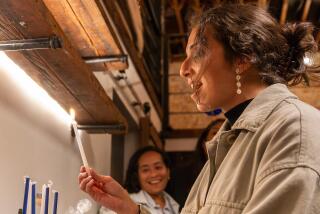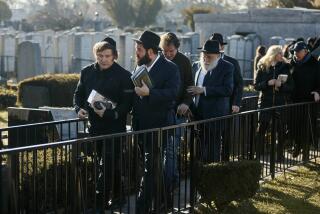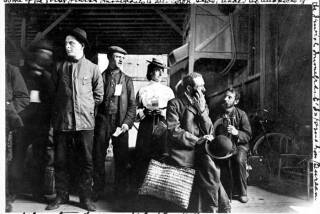Rabbis’ Drug Charges Rock a Brooklyn Hasidic Sect
- Share via
NEW YORK — Some people in the closely knit, highly religious Bobov Hasidic community in Brooklyn were so nervous Wednesday they were afraid to tell the Grand Rabbi.
What they have is bad news, spreading quickly through the streets of Borough Park.
Amazing as it seemed, two Orthodox Jewish rabbis, Bernard Grunfeld, 64, and Mahir Reiss, 47, were among a dozen people charged by federal prosecutors with conspiring to launder and hide more than $1.75 million in profits by Colombian drug dealers.
According to an indictment filed in federal court in Brooklyn on Tuesday, the rabbis--for commissions of up to 15%--ran the cash through the bank accounts of a synagogue and a religious school.
Not only that, the men--who held rabbinical degrees--allegedly provided $3.4 million from U.S. and Swiss bank accounts to buy an aircraft for Colombian drug traffickers.
Charges of such un-Talmudical behavior elicited exclamations of amazement on Wednesday.
“Bobov is a wonderful community known for kindness and charity,” said Democratic New York state Assemblyman Dov Hikind, who represents the largely Hasidic neighborhood. “They are completely shocked by the terrible allegations and hope and pray they are not true.”
Former Mayor Edward I. Koch, who once recognized the political power of the sect by naming a street Bobov Promenade, added: “I am Jewish and I am outraged.”
A community leader in Borough Park, who requested anonymity, said Wednesday that he had known Reiss for 30 years.
“He has not been practicing. He doesn’t have a congregation. He is a businessman,” the leader said.
Sources said Grand Rabbi Solomon Halberstam, at the age of 89, does not read the secular press, and associates believe they will be able to hide the bad news from the revered cleric.
A lawyer for Reiss, Susan Kellman, said the complaint is “filled with a variety of gross distortions,” and she predicted her client would be vindicated. An attorney for Grunfeld declined comment.
According to the complaint, Grunfeld works for several nonprofit religious organizations, including a yeshiva, with the same address in Borough Park. Prosecutors said he serves as president of Chaim Shel Shulem, which operates as a religious institution.
“A review of various financial records indicates that these entities maintained numerous bank accounts at various financial institutions in Brooklyn,” the complaint said.
It charged that Grunfeld and an associate made numerous cash transactions just below the $10,000 limit, which triggers reporting by the bank to the Internal Revenue Service.
During questioning by an IRS agent, Grunfeld denied being aware of the reporting regulation, but then he continued to make cash withdrawals designed to avoid detection, court papers said.
The complaint charged that the withdrawals were in the form of bank checks made payable to various entities, according to instructions given by the Colombian drug dealers.
Reiss apparently was not affiliated with any religious organization.
Prosecutors alleged that Reiss’ brother, Abraham, who was also charged, collected cash from a stash house operated by the drug dealers in Manhattan, and, ultimately, the funds were withdrawn by Grunfeld in the name of Chaim Shel Shulem.
Government lawyers charged that Reiss also took part in the money laundering scheme, and with his brother and Grunfeld, provided financing for the purchase of a plane by Colombian drug traffickers.
As part of the plane purchase, prosecutors alleged that Reiss assisted with the wire transfer of about $2.4 million to make additional payments for the aircraft.
In November 1994, the plane--a Beech Super King Air B300--was flown from St. Lucie County Airport in Florida to Medellin, Colombia.
Seven defendants were arrested earlier in the week, ending an investigation that began in 1994 and involved wiretaps, undercover operatives who posed as money launderers and extensive surveillance.
“Money launderers are the indispensable partners of major drug traffickers,” said Zachary W. Carter, the U.S. attorney in Brooklyn, where the indictments were filed. “The cynical act of using religious institutions to conceal drug proceeds is particularly reprehensible.”
Both rabbis were released on $750,000 bond secured by property. If convicted, they could face 20 years in prison.
Traffickers have used the clergy to help fund their operations before. In 1994, a federal jury in Los Angeles convicted Abraham Low, rabbi at Mogen Abraham, an Orthodox synagogue, of conspiracy to launder drug money.
Times staff writer Eric Malnic in Los Angeles and special correspondent Lisa Meyer in New York contributed to this story.
More to Read
Sign up for Essential California
The most important California stories and recommendations in your inbox every morning.
You may occasionally receive promotional content from the Los Angeles Times.










